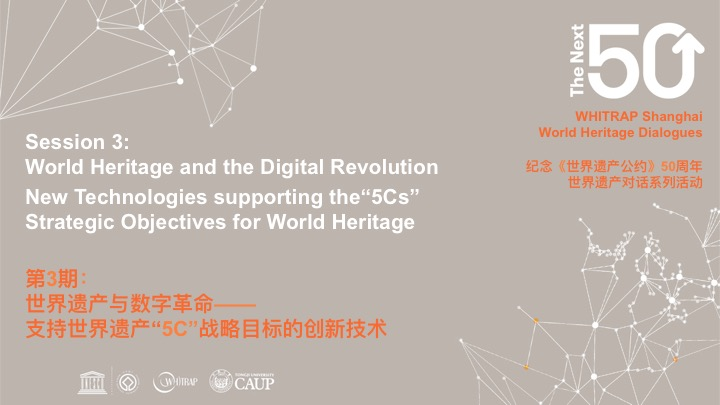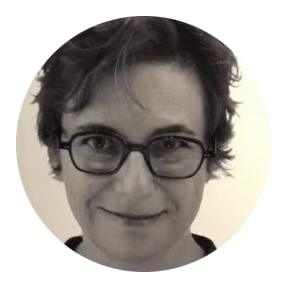| Preview | 3rd WHITRAP World Heritage Dialogue: The Digital Revolution |
| PublishDate:2022-08-04 Hits:2696 |
World Heritage Dialogues for the 50th Anniversary of the World Heritage Convention See the Calendar of the World Heritage Dialogues series: http://www.whitr-ap.org/index.php?classid=1461&newsid=3310&t=show
Session 3:
World Heritage and the Digital Revolution
New technologies supporting the “5Cs” Strategic Objectives for World Heritage
Wednesday 17 August 2022
Online 14:00-16:00 Beijing time (UTC + 8)
 Live-streaming link:
https://wx.vzan.com/live/tvchat-2086961061?v=637950330823566973 From 11 June to 16 November 2022, WHITRAP Shanghai will organize a series of 6 monthly online World Heritage Dialogues including a WHITRAP Herit-AP Chat, in July, hosted by the College of Architecture and Urban Planning (CAUP) Tongji University (Shanghai, China) to celebrate the 50th Anniversary of the Convention Concerning the Protection of the World Cultural and Natural Heritage, which was adopted on 16th November 1972 by the General Conference of UNESCO. The 3rd Dialogue will be held on 17 August 2020 from 14.00-16:00 Beijing time (UTC+8). The theme is World Heritage and the Digital Revolution. New technologies supporting the “5Cs” Strategic Objectives for World Heritage. New technologies, in particular digital tools, have become an integral part of our lives and the COVID 19 pandemic has made our world increasingly digital. The 3rd WHITRAP Shanghai World Heritage Dialogue will explore how the new can help enhance the old through examples and case studies from the Asia and Pacific Region. Digital tools can help in documenting heritage, by revealing unknown values, recording less well documented heritage or help update knowledge. Digital tools can facilitate monitoring and reporting on the state of conservation and evolution of natural and cultural heritage, be it at small or large scale as well as in different types of extreme environments. Digital tools also play an increasingly important role as means for providing interpretation of World Heritage sites to the public on site, at home or in the classroom. This was particularly demonstrated during the COVID 19 pandemic. Social media have a growing role, they allow sharing information on heritage to the public as well as allowing people to share information on heritage to further promote it or alert on threats.
Digital tools as discussed above benefits World Heritage properties by improving knowledge, monitoring and interpretation. Heritage can also benefit people, when new infrastructures are developed for allowing better access to sites for example, bringing or upgrading telecommunications for example. Developing new digital tools, applications, software, news use can become sources of economic development. Digital tools create and ensure the distribution of data, information and knowledge, which constitute valuable sources. These sources have as much heritage values as ancient stick charts of the Marshall Islands or the Chinese Mawangdui Silk Texts for example. In this regard, World Heritage contributes to creating its own digital heritage. It is as fragile as archaeological artefacts or ancient manuscripts, not because of the impact of time on their physical structure, but because of the impact of the unprecedented speed of change on their virtual and evanescent nature. Due to their rapidly ever-evolving nature, digital material requires to be stored and archived at the same pace of change. Beforehand however, its values need to be acknowledged.
The Dialogue aims to encourage peer-to-peer discussions on the best approach to adopting digital technologies as well as exploring how they can have a positive impact on World Heritage and allow World Heritage to improve our quality of life. More specifically, based on their experience, participants to the Dialogue are invited to share their thoughts on how new technologies can best support the “5Cs” Strategic Objectives for World Heritage (Credibility, Conservation, Capacity Building, Communication, Communities) for the implementation of the World Heritage Convention as defined in the Budapest Declaration in 2002 and updated in 2007. Through specific examples or by presenting a range of issues, participants will provide a snapshot of what has been done in the past decades and what could or should be done in the future. They will contribute to imagining the Next 50: World Heritage as a source of resilience, humanity and innovation. How can we, as expressed by the World Heritage Centre, UNESCO, Imagine Heritage in the Digital Dimension as a means to promote the 5C’s in a positive integrated manner, benefiting all types of people without leaving anyone behind or falling into a delusional spatial and time warp disconnected from the tangible and intangible values of heritage itself.
The outcomes of the Dialogue will be shared in the international conference “World Heritage and Urban-Rural Sustainable Development: Resilience and Innovation”, 15-16 November 2022, organized by the College of Architecture and Urban Planning (CAUP) Tongji University (Shanghai, China) and WHITRAP. The Dialogues and the Conference are part of CAUP Tongji University and WHITRAP’s activities to commemorate the 50th Anniversary of the World Heritage Convention as well as the 40th Anniversary of China’s Famous Historical and Cultural City List and the 70th Anniversary of CAUP Tongji University, and the Tongji Planning Centennial. The commemoration activities also include an offline and online public exhibition World Heritage Cities: Past, Present and Future (16 to 30 November 2022).
One of the key features of the World Heritage Convention is linking the protection of both tangible natural and cultural heritage. It also focuses on the identification of heritage in a changing world and on the importance of safeguarding it as well as defining the role and function of heritage in communities’ lives. The Convention addresses the constantly changing issues of the contemporary world, reaffirming its importance in promoting culture and heritage as a key resource within development processes and a means of improving the quality of our lives as advocated by key international agendas like the United Nations 2030 Agenda for Sustainable Development, adopted in 2015. The implementation of the Convention is in itself dynamic, bridging the skills and ingenuity of traditional know-hows and new technologies.
a) strengthen the Credibility of the World Heritage List, as a representative and geographically balanced testimony of cultural and natural properties of outstanding universal value; b) ensure the effective Conservation of World Heritage properties; c) promote the development of effective Capacity-building measures, including assistance for preparing the nomination of properties to the World Heritage List, for the understanding and implementation of the World Heritage Convention and related instruments; d) increase public awareness, involvement and support for World Heritage through Communication; e) enhance the role of Communities in the implementation of the World Heritage Convention.
The online Dialogues will be in English with simultaneous interpretation in Chinese. Video recordings of the Dialogue and a brief synthesis will be published online on the WHIRTAP website. Agenda
World Heritage and the Digital RevolutionNew technologies supporting the “5Cs” Strategic Objectives for World Heritage Wednesday 17 August 2022 Online 14:00-16:00 Beijing time (UTC+8)
14:00-14:15 Introduction Marie-Noël TOURNOUX, Project Director, WHITRAP Shanghai
Prof. YANG Chen, CAUP Tongji University
14:30-15:05 Pecha Kucha Prof. CHEN Fulong, Deputy Director HIST(UNESCO Category 2 Centre), Beijing, ChinaFebriyanti SURAYANINGISH, Director of the Pusat Dokumentasi Arsitektur, Jakarta, Indonesia HAN Jie, Associate Professor, School of Architecture and Civil Engineering, Xiamen University, Xiamen, China Mayura GADKARI, Urban Development Practioner, National Institute of Urban Affairs, New Delhi, India Tina PATERNO, President ICOMOS Philippines, Philippines
15:05-15:50 Round Table Discussion Moderator: Prof. YANG Chen, CAUP Tongji UniversityProf. CHEN Fulong, Febriyanti SURAYANINGISH, Associate Prof. HAN Jie, Mayura GADKARI, Tina PATERNO
15:50-16:00 Wrap up Marie-Noël TOURNOUX, Project Director, WHITRAP Shanghai
Participants
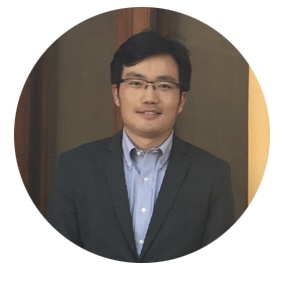 Prof. YANG Chen CAUP Tongji University, Shanghai, China
Marie-Noël TOURNOUX
Project Director, WHITRAP Shanghai
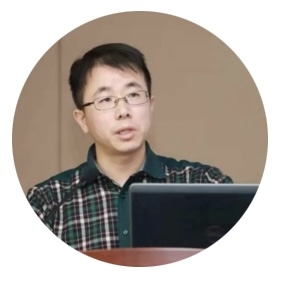 Prof. CHEN Fulong
Deputy Director, HIST(UNESCO Category 2 Centre), Beijing, China
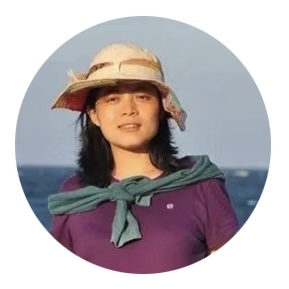 Associate Prof. HAN Jie
School of Architecture and Civil Engineering, Xiamen University, Xiamen, China
 Febriyanti SURAYANINGISH
Director of the Pusat Dokumentasi Arsitektur, Jakarta, Indonesia
 Mayura GADKARI
Urban Development Practioner, National Institute of Urban Affairs, New Delhi, India
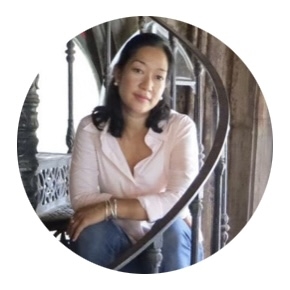 Tina PATERNO
President ICOMOS Philippines, Philippines
For more information, you may refer to the Booklet PDF.
Read More:
Dialogues Session 1 - World Heritage and Quality of Life Announcement: http://www.whitr-ap.org/index.php?classid=1461&newsid=3312&t=show Summary: http://www.whitr-ap.org/?classid=1461&newsid=3315&t=show Video Playback: http://heritap.whitr-ap.org/index.php?classid=12497&id=34&t=show
Dialogues Session 2 - Rural Heritage Announcement: http://www.whitr-ap.org/index.php?mod=news&classid=1461&newsid=3329&t=show |
- SEAMEO SPAFA-WHITRAP Training Workshop on Heritage Impact Assessment held in Melaka
- Call for Application | 2024 Global Awards for World Heritage Education Innovative Cases(AWHEIC) Promoting what people do and how they do it
- Documentary: 2023 World Heritage Creative X Innovators Conference and the AWHEIC Third Anniversary Celebration
- Publication | WHITRAP Newsletter No. 61
- Mt. Huangshan first show in Climate Action for World Heritage
- Call for Good Practices: 2024 Environment and Resilience
Copyright © 2009-2012 World Heritage Institute of Training and Research-Asia and Pacific (shanghai)


